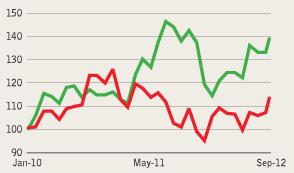Ups and Downs
The Burmese currency fell this week; in Rangoon the US dollar currently buys 985 kyat (4 kyat up from last week) and sells at 989 kyat (2 kyat up). Gold is up this week from 643,800 kyat per tical to 648,900. Fuel remains constant: petrol is at 820 kyat per litre, diesel 940 kyat, and octane 920 kyat. Good quality Pawsanhmwe rice sells in Rangoon markets this week for 1,200-1,300 kyat per basket while low-quality Emata rice is still at 859-900 kyat per basket.
Burma files $1.2bn trade deficit
Burma suffered a trade deficit of US$1.256 billion in the eight months to November of the fiscal year 2013-14, official media reported Saturday. During that period, foreign trade totaled $15.54 billion, of which the export amounted to $7.141 billion dollars and the import stood at $8.397 billion dollars, the Central Statistical Organization was quoted as saying by the New Light of Myanmar. Of the total export, border trade accounted for $2.012 billion.
Private firms pump more petrol
The Burmese authorities have granted green lights to the opening of 801 private fuel filling stations in the country this year. Altogether, 1,243 applicants have sought licenses for operating private gas stations since 2010, said the 7-Day News, adding that the remaining 442 applicants are under consideration for permission. Privately-owned gas stations have been allowed in Burma since June 2010, before which all gas stations were state run.
Ooredoo contracts Nokia for 3G network
Qatari telecoms firm Ooredoo has selected Nokia Siemens Networks (NSN) to deploy its 3G network in Burma, which is due to be introduced in 2014. The two companies have signed a two-year agreement, which will see NSN construct a 3G radio access network on 900-MHz and 2,100-MHz bands. The deal reportedly includes network implementation, planning and optimisation, systems integration, and care services.
Advertising in Burma hits new heights
Advertising expenditure in Burma has increased this year to US$118 million, a fivefold leap from five years ago when it was just $24 million. By the end of this fiscal year, advertising is expected to hit $180 million, according to a report on 26 December by Channel News Asia. “The advertising scene is quickly changing with the creativity in foreign competition, which is in turn firing up the attempts of local companies in this fast-changing market,” the report said, noting that renowned international brands like Coca-Cola and Unilever are the latest advertising game changers in Burma.
Kaladan project scheduled to open in mid-2014
The Kaladan Multi-Modal Transit Transport Project, jointly implemented by Burma and India, is expected to be completed by mid-2014, various media reports said on Thursday. The project is an Indian government initiative to connect Kolkata with Sittwe port in Burma by sea, then to Mizoram via river and road. The aim is to provide India with trade and transport links to its northeastern states, which are otherwise inaccessible overland via India’s rugged mountainous region. According to the contractor Essar Company, the first of the three-phase project has been 70 percent completed, reported Xinhua. The first phase includes construction of Sittwe Deep Seaport and Paletwa Jetty in Chin state, dredging the Kaladan waterway and the construction of six vessels. The second phase covers construction of a 109 km-long road to link Paletwa with the Burma-India border region, and the third phase involves construction of a highway between India’s Mizoram state and Chin state. The completion of a waterway and highway crossing Burma’s Arakan and Chin states would help support better transport and trade between the regional countries, the report said. Burma and India signed the US$214 million contract in 2008.
China still looks to Turkmenistan for natural gas
China imported 1.73 million metric tons of natural gas via pipelines in 2013, up 8.2 percent on last year, according to data released by the General Administration of Customs last week. Of that figure, natural gas from Burma still only accounts for 41,263 metric tons, following the opening of the Shwe gas pipeline earlier this year. Although China’s gas imports from Turkmenistan fell 5.1 percent this year, the country was by far the largest supplier of natural gas to China with exports of 1.52 million metric tons. The Turkmen-Uzbek pipeline is operated by China’s state-owned China National Petroleum Corp (CNPC), the same firm which has the main stake in the trans-Burma oil and gas pipeline project.
Burma is 8th largest rice producer in the world
China remains the largest producer of rice in the world with an annual turnover of some 143 million metric tons, followed by India on 99 million tons. Indonesia is third with 37 million tons, followed by Bangladesh (34 million tons), Vietnam (27 million), Thailand (20.5 million) and the Philippines (11 million tons). Burma is close behind with annual production estimated at 10.75 million tons, ahead of Brazil and Japan.
[related]



